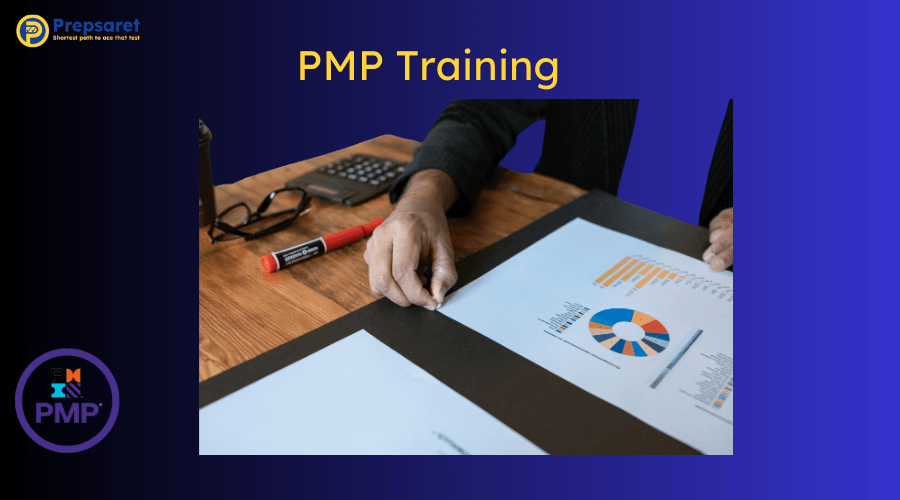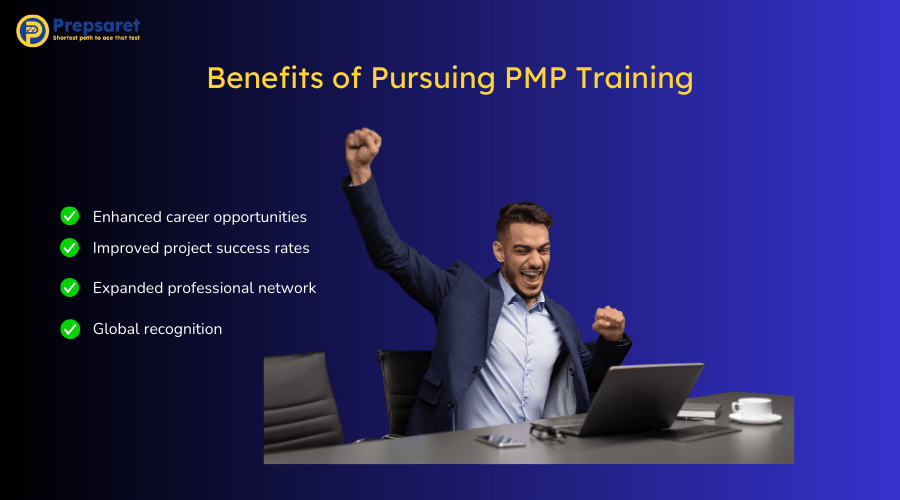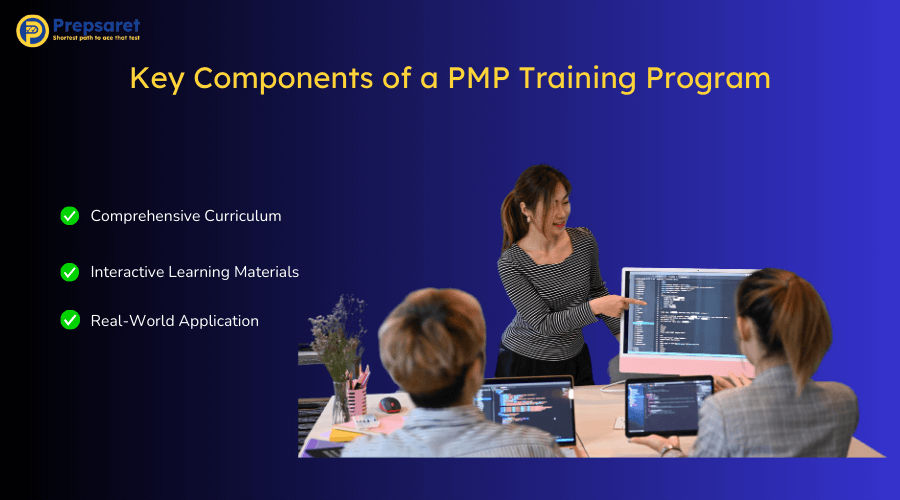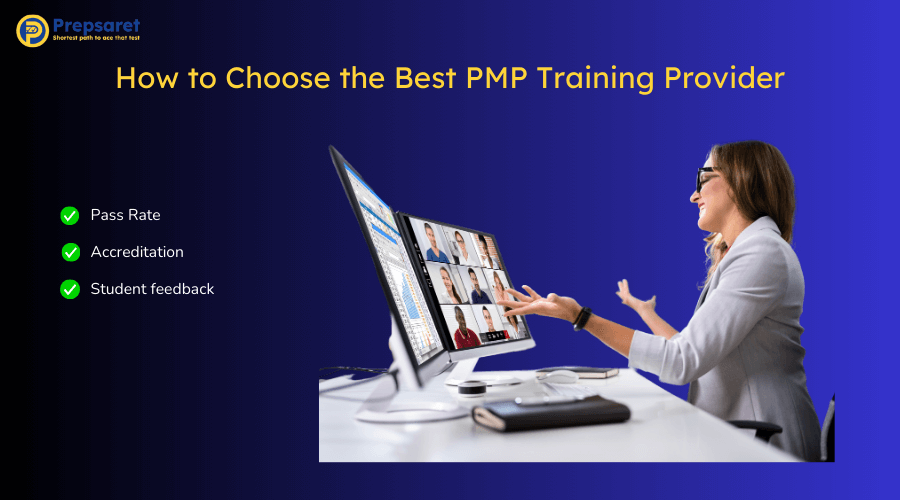Imagine walking into a project with clear goals, a roadmap to success, and the tools to navigate challenges like a pro. That’s what PMP training offers! PMP (Project Management Professional) training equips professionals with the essential knowledge, tools, and best practices to thrive in project management roles.
Not only does it prepare candidates for the rigorous PMP exam, but it also sharpens their skills to tackle real-world projects confidently. PMP training is available in various formats, including online courses, in-person classes, and self-paced study options. Each caters to different learning preferences, making it accessible to a broad audience.
Why is PMP training critical? The PMP exam is no walk in the park—it’s known for its complexity and comprehensive scope. Structured training ensures candidates are well-prepared, boosting their chances of passing on the first attempt. Start your PMP training today with expert-led courses and mock exams from Prepsaret designed for first-attempt success!
The Importance of PMP Training for Project Managers
The PMP certification is a globally recognized credential that demonstrates a professional’s expertise in project management. For project managers, it’s a game-changer. It not only opens doors to better opportunities but also solidifies their credibility in leading successful projects.
Here’s why PMP Certification Training is indispensable:
- It provides an in-depth understanding of project management principles.
- It helps professionals stay updated with the latest trends, tools, and methodologies.
- It fosters confidence in managing complex projects, budgets, and teams.
For those not yet eligible for the PMP, the CAPM certification (Certified Associate in Project Management) is an excellent starting point. It covers essential project management concepts and serves as a stepping stone toward full PMP certification.
Understanding PMP Training Course Structures
A PMP certification course is meticulously designed to cover all aspects of project management, including:
- PMBOK® Guide: The foundational resource for the PMP exam prep.
- Project management processes and frameworks: From initiating to closing.
- Key knowledge areas: Like scope, time, cost, quality, and risk management.
- Exam preparation: Mock tests, quizzes, and exam strategies.
Learning formats vary to suit different needs:
- Self-paced courses: Perfect for those with a busy schedule.
- Instructor-led training: Ideal for learners who thrive in structured, interactive environments.
- Hybrid options: A mix of self-paced and live sessions.
Choose the format that works best for you and your learning style!
Benefits of Pursuing PMP Training
Investing in PMP certification training pays off in many ways. Here are five standout benefits:
- Enhanced career opportunities: PMP-certified professionals are in high demand and command higher salaries.
- Global recognition: The PMP certification is respected across industries and countries.
- Improved project success rates: Training equips you with strategies to deliver projects on time and within budget.
- Expanded professional network: Join a global community of project managers through PMP training programs.
- Personal growth: Gain confidence, leadership skills, and the ability to handle challenging projects.
Find out: How to Get PMP Certified
How PMP Training Enhances Team Leadership and Collaboration Skills
Strong leadership and collaboration are at the heart of project management. PMP training online sharpens these skills by teaching effective communication, conflict resolution, and stakeholder engagement techniques.
Through role-playing exercises and case studies, you’ll learn how to:
- Lead diverse teams with confidence.
- Foster open communication and collaboration.
- Resolve conflicts diplomatically.
- Align team efforts with project goals.
As a result, you’ll not only lead projects but inspire teams to achieve greatness.
Key Components of a PMP Training Program
A PMP training program is designed to equip you with the skills, knowledge, and confidence needed to pass the PMP exam and manage projects like a pro. Here’s what you can expect from a solid training program:
Comprehensive Curriculum
A good PMP certification course will cover all five process groups: Initiating, Planning, Executing, Monitoring and Controlling, and Closing. You’ll dive deep into the ten knowledge areas such as integration, scope, time, cost, and risk management.
The curriculum also introduces you to industry-standard tools and techniques that will help you succeed in real-life project management scenarios.
Interactive Learning Materials
Most programs use a mix of reading materials, videos, case studies, and group discussions to pass the PMP exam.
This approach ensures that you don’t just memorize the material but understand it. The training will help you see how these concepts come to life in different industries and types of projects.
Real-World Application
It’s one thing to understand the theory, but how does it work in the real world? A great PMP certification training program connects the dots between textbook knowledge and practical application, giving you the tools to apply what you’ve learned directly to your work.
This is done through case studies, role-playing exercises, and group activities.
Integrating PMP Training with Real-World Project Management Skills
A strong PMP certification course doesn’t just focus on theory—it integrates project management knowledge with practical skills that you can use right away in the workplace. You might practice:
- Creating project schedules.
- Managing budgets.
- Handling project risks and stakeholder communications.
For example, in some PMP training online programs, you might be asked to build a project plan for a hypothetical scenario, giving you hands-on experience in managing scope, deadlines, and resources.
Exam Preparation Strategies Within PMP Training Programs
Let’s face it: The PMP exam can be tough! But don’t worry, a well-structured PMP certification training program has you covered. Here are some of the key study strategies you’ll likely encounter:
- Mock Exams: Practice makes perfect! Taking mock exams helps you get familiar with the format, timing, and types of questions you’ll face.
- Time Management: PMP Exam Prep programs teach you techniques for managing your study time and pacing yourself during the actual exam.
- Mastering ITTO: Understanding Inputs, Tools, Techniques, and Outputs (ITTOs) is critical for the exam. Your training will break these down and show you how they fit within process groups and knowledge areas.
- Knowledge Areas: You’ll also get lots of guidance on memorizing and applying the 10 knowledge areas that cover everything from risk to quality management.
These PMP Exam Prep methods ensure that when exam day arrives, you’re not just ready—you’re confident and prepared.
Related post: PMP Exam Preparation Tips
Understanding the PMP Certification Cost
One of the common concerns among aspiring project managers is the PMP certification cost. The price varies depending on membership status with PMI, training format, and additional study materials.
While PMP training free options exist for foundational learning, a full-fledged PMP certification training program is a worthwhile investment for career growth.
Related post: What Is the Passing Score for the PMP Examination?
Eligibility Criteria for PMP Training and Certification
Before you can sit for the PMP exam, you need to meet a few eligibility requirements. Here’s a breakdown of what you need:
Education
You need a secondary degree (high school diploma, associate’s degree, or global equivalent) and 5 years of project management experience. If you hold a four-year degree (bachelor’s degree or global equivalent), the experience requirement drops to 3 years.
Experience
For the PMP certification, you’ll need a certain number of hours of project management experience, which depends on your educational background. If you have a secondary degree, you need 7,500 hours leading projects. With a four-year degree, you need 4,500 hours.
Project Management Education
No matter your background, you’ll need 35 hours of formal project management education. This is where PMP certification classes come in.
Enrolling in the best PMP training courses ensures that you meet PMI’s educational requirements while gaining in-depth knowledge of project management principles. Many candidates choose a PMP bootcamp to complete these hours quickly and efficiently.
Once you’ve covered these three components, you’re ready to apply for the PMP exam!
How to Choose the Best PMP Training Provider
Choosing the right training provider is crucial for your success. Here’s what to look for:
- Accreditation: Ensure the provider is recognized by the Project Management Institute (PMI). They should offer PMP training for beginners and experienced professionals alike, following PMI’s standards.
- Reviews and Testimonials: Look at past students’ feedback. A high rating and positive reviews usually indicate that the provider delivers quality training that leads to success.
- Learning Style: Make sure the provider’s teaching style matches how you learn best. Some providers offer best online PMP courses with certification, while others focus on in-person options.
- Pass Rate: A good provider will proudly share their pass rate for the PMP exam. If the pass rate is high, it’s a sign that their training works!
Check this out: Try PMP Free Questions
Online vs. In-Person PMP Training: Pros and Cons
When choosing your PMP training, you have two main options: online or in-person. Let’s weigh the pros and cons of each.
Online PMP Training
Pros:
- Flexibility: Study at your own pace and from the comfort of your home.
- Accessibility: You can take PMP training near me or enroll in a program from top providers worldwide.
- Convenience: Many online programs allow you to revisit lessons and materials whenever you need.
Cons:
- Less Direct Interaction: While you can ask questions, you don’t get the same face-to-face experience as in-person training.
- Distractions: Studying from home can be full of distractions, which might affect your focus.
In-Person PMP Training
Pros:
- Interactive Learning: You get to participate in live discussions, group activities, and role-playing exercises.
- Networking: In-person classes often allow you to connect with other project managers, expanding your professional network.
- Motivation: Some people find it easier to stay motivated in a classroom setting.
Cons:
- Less Flexible: You need to attend classes at set times, which may not work with your schedule.
- Travel: Depending on the location, you may need to commute, which could be time-consuming.
Comparison Table: Online vs. In-Person PMP Training
| Feature | Online PMP Training | In-Person PMP Training |
| Flexibility | Study anytime, anywhere | Set class times |
| Interaction | Limited, mostly online forums | Live discussions and activities |
| Networking | Virtual networking opportunities | In-person networking opportunities |
| Convenience | Access from anywhere | Travel may be required |
| Motivation | Self-paced, can be challenging | Structured schedule |
Continue reading: What Materials You Should Study to Pass the 2025 PMP Exam
Tips for Maximizing Success in PMP Training
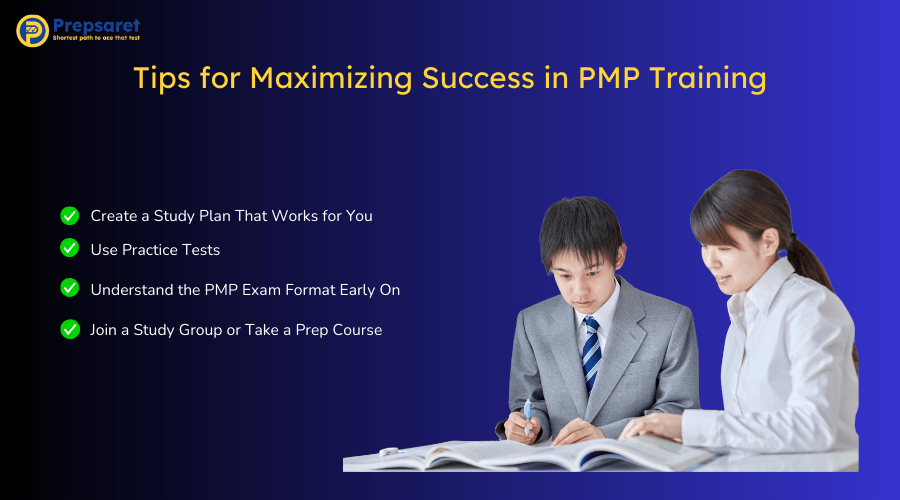
If you’re considering a fast-track PMP certification, you’re on the right path to advancing your career. But, like any big goal, PMP training can feel daunting at first. Here are some tips to help you succeed:
- Understand the PMP Exam Format Early On: The PMP exam consists of multiple-choice, matching, and scenario-based questions. Taking a PMP certification training free session can help you familiarize yourself with the exam format before investing in a full course.
- Create a Study Plan That Works for You: Time management is key. If you’re short on time, consider a PMP bootcamp to accelerate your learning.
- Use Practice Tests: Practice exams help you assess your understanding. Many PMP training discount offers include free practice questions.
- Join a Study Group or Take a Prep Course: If you’re looking for structured learning, buy a PMP exam prep course from a reputable provider.
Average Cost and Time Investment for PMP Training
Now, let’s talk about the practical aspects of getting PMP certified.
Cost Breakdown
- Exam Fee: The PMP exam costs around $555 for non-PMI members and $405 for members.
- Training Course Fees: Depending on the provider and format, PMP training cost can range from $400 to $2,500. Online PMP training is generally more affordable.
Time Investment
- Study Hours: Most candidates spend around 100 to 150 hours preparing.
- Course Duration: A typical best PMP training course lasts 4 to 6 weeks.
Common Challenges in PMP Training and How to Overcome Them
Even the best PMP training for beginners comes with challenges. Here’s how to tackle them:
- Understanding ITTOs (Inputs, Tools, Techniques, and Outputs): ITTOs can be confusing, but a well-structured PMP certification class will help simplify these concepts.
- Time Management: Consider fast-track PMP certification options if you need a structured study plan.
- Test Anxiety: Reduce nervousness by taking mock exams, many of which are available in PMP certification training free sessions.
The Role of PMP Training in Advancing Your Career
Investing in PMP training near me or an online option can significantly boost your career.
- Boost Your Credibility: PMP certification is globally recognized and demonstrates your expertise in project management.It’s a stamp of approval from the Project Management Institute (PMI) that employers respect.
- Career Growth Opportunities: PMP-certified professionals often see salary increases and better job prospects.
Why Study with Prepsaret for Your PMP Exam
Prepsaret is a top choice for many candidates preparing for the PMP exam. Our PMP Test Prep courses include interactive quizzes, practice tests, and expert guidance.
- Enroll in PMP training with Prepsaret and follow a structured learning path.
- Get PMP certified online with their comprehensive prep courses.
- PMP training discount offers are available for early enrollments.
With a high success rate, Prepsaret’s proven strategies ensure you pass the PMP exam on your first try!
FAQs
How Much Does PMP Training Cost?
The cost of PMP training varies widely based on the provider and format. Generally, training fees range from $300 to $3,000.
For PMI members, the exam fee is $405, while non-members pay $555. Additional costs include a PMI membership fee of $129 annually. Online courses typically cost between $500 and $1,000, with some institutions offering free trial courses.
What is the PMP Salary?
Project Management Professional (PMP) salaries vary based on experience, industry, and location. In the United States, the average salary for project managers is approximately $109,000 annually, with entry-level positions starting around $64,580.
Specialized roles, such as IT project managers, can earn significantly more, averaging $124,008. Senior positions like portfolio managers may command salaries up to $147,000. Overall, PMP certification can enhance earning potential in this field.
How Much Does it Cost to Get PMP Certification?
The cost of obtaining Project Management Professional (PMP) certification varies based on membership status. For PMI members, the exam fee is $405, while non-members pay $555. Additionally, there is a $129 annual membership fee and a $10 application fee.
Training courses can range from $300 to $3,000, depending on the provider and format, with online courses typically costing between $500 and $1,000.
Is PMP Very Difficult?
The PMP (Project Management Professional) exam is widely regarded as difficult, with a passing rate around 60%.
It tests candidates on a broad syllabus that includes practical application and scenario-based questions, requiring deep understanding of project management principles.
Many find the exam challenging due to its rigorous nature and the need for effective time management during the 180 questions in 230 minutes. Preparation is crucial for success.
What Training is Required for PMP?
To obtain the Project Management Professional (PMP) certification, candidates must meet specific training and experience requirements. This includes completing 35 hours of formal project management education.
Additionally, candidates with a four-year degree need 36 months of leading projects, while those with a secondary degree require 60 months.
The experience must be documented and verified, emphasizing practical project management skills aligned with the PMBOK Guide standards set by the Project Management Institute (PMI).

